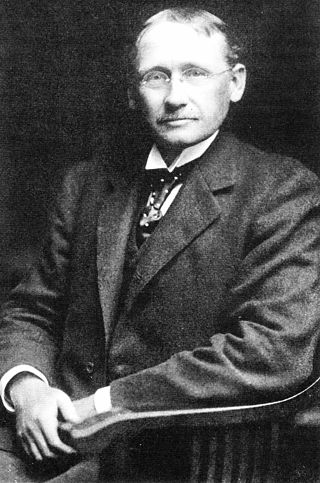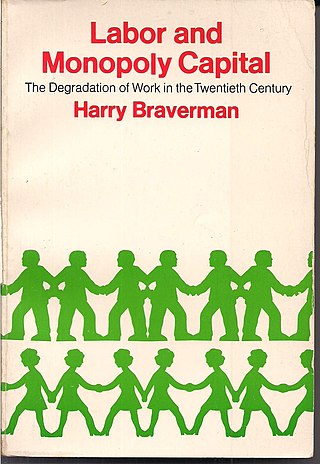
Industrial and organizational psychology is the science of human behavior in the workplace. It is an applied discipline within psychology. Depending on the country or region of the world, I-O psychology is also known as occupational psychology in the United Kingdom, organisational psychology in Australia and New Zealand, and work and organizational (WO) psychology throughout Europe and Brazil. Industrial, work, and organizational (IWO) psychology is the broader, more global term for the science and profession.
Human resources (HR) is the set of people who make up the workforce of an organization, business sector, industry, or economy. A narrower concept is human capital, the knowledge and skills which the individuals command. Similar terms include manpower, labor, personnel, associates or simply: people.

Remote work, also called work from home (WFH), work from anywhere, telework, remote job, mobile work, and distance work is an employment arrangement in which employees do not commute to a central place of work, such as an office building, warehouse, or retail store. Instead, work can be accomplished in the home, such as in a study, a small office/home office and/or a telecentre. A company in which all workers perform remote work is known as a distributed company.

Work design is an area of research and practice within industrial and organizational psychology, and is concerned with the "content and organization of one's work tasks, activities, relationships, and responsibilities" (p. 662). Research has demonstrated that work design has important implications for individual employees, teams, organisations, and society.
A skill is the learned ability to act with determined results with good execution often within a given amount of time, energy, or both. Skills can often be divided into domain-general and domain-specific skills. For example, in the domain of work, some general skills would include time management, teamwork and leadership, self-motivation and others, whereas domain-specific skills would be used only for a certain job. Skill usually requires certain environmental stimuli and situations to assess the level of skill being shown and used.

Scientific management is a theory of management that analyzes and synthesizes workflows. Its main objective is improving economic efficiency, especially labor productivity. It was one of the earliest attempts to apply science to the engineering of processes to management. Scientific management is sometimes known as Taylorism after its pioneer, Frederick Winslow Taylor.

George Elton Mayo was an Australian born psychologist, industrial researcher, and organizational theorist. Mayo was formally trained at the University of Adelaide, acquiring a Bachelor of Arts Degree graduating with First Class Honours, majoring in philosophy and psychology, and was later awarded an honorary Master of Arts Degree from the University of Queensland (UQ).

Organizational theory refers to the set of interrelated concepts that involve the sociological study of the structures and operations of formal social organizations. Organizational theory also seeks to explain how interrelated units of organization either connect or do not connect with each other. Organizational theory also concerns understanding how groups of individuals behave, which may differ from the behavior of an individual. The behavior organizational theory often focuses on is goal-directed. Organizational theory covers both intra-organizational and inter-organizational fields of study.
The Hawthorne effect is a type of reactivity in which individuals modify an aspect of their behavior in response to their awareness of being observed. The effect was discovered in the context of research conducted at the Hawthorne Western Electric plant; however, some scholars feel the descriptions are apocryphal.
Organizational behavior (OB) or organisational behaviour is the: "study of human behavior in organizational settings, the interface between human behavior and the organization, and the organization itself". OB research can be categorized in at least three ways:
Participatory management is the practice of empowering members of a group, such as employees of a company or citizens of a community, to participate in organizational decision making. It is used as an alternative to traditional vertical management structures, which has shown to be less effective as participants are growing less interested in their leader's expectations due to a lack of recognition of the participant's effort or opinion.
People skills are patterns of behavior and behavioral interactions. Among people, it is an umbrella term for skills under three related set of abilities: personal effectiveness, interaction skills, and intercession skills. This is an area of exploration about how a person behaves and how they are perceived irrespective of their thinking and feeling. It is further elaborated as dynamics between personal ecology and its function with other people's personality styles in numerous environments. British dictionary definition is "the ability to communicate effectively with people in a friendly way, especially in business" or personal effectiveness skills. In business it is a connection among people in a humane level to achieve productivity.

Labor and Monopoly Capital: The Degradation of Work in the Twentieth Century is a book about the economics and sociology of work under monopoly capitalism by the political economist Harry Braverman. Building on Monopoly Capital by Paul A. Baran and Paul Sweezy, it was first published in 1974 by Monthly Review Press.
The history of contingency theories of leadership goes back over more than 100 years, with foundational ideas rooted in the mechanical thought of Taylorism. Later, management science began to recognize the influence of sometimes irrational human perceptions on worker performance. This led to taxonomies of leadership behavior and to contingency theories to adapt leadership behavior to the situation.
Workplace relationships are unique interpersonal relationships with important implications for the individuals in those relationships, and the organizations in which the relationships exist and develop.
Employee motivation is an intrinsic and internal drive to put forth the necessary effort and action towards work-related activities. It has been broadly defined as the "psychological forces that determine the direction of a person's behavior in an organisation, a person's level of effort and a person's level of persistence". Also, "Motivation can be thought of as the willingness to expend energy to achieve a goal or a reward. Motivation at work has been defined as 'the sum of the processes that influence the arousal, direction, and maintenance of behaviors relevant to work settings'." Motivated employees are essential to the success of an organization as motivated employees are generally more productive at the work place.
High-commitment management is a management style that emphasizes personal responsibility, independence, and empowerment of employees across all levels instead of focusing on one higher power; it always intended to keep commitment at high level “calling all the shots”.
Workplace democracy is the application of democracy in various forms to the workplace. It can be implemented in a variety of ways, depending on the size, culture, and other variables of an organization.
Machiavellianism in the workplace is a concept studied by many organizational psychologists. Conceptualized originally by Richard Christie and Florence Geis, Machiavellianism refers to a psychological trait concept where individuals behave in a cold and duplicitous manner. It has in recent times been adapted and applied to the context of the workplace and organizations by many writers and academics.
Charles D. Wrege was an American management historian, and Professor at Rutgers University. He is known for his contributions to management history, especially his critical work on Frederick W. Taylor and scientific management.





